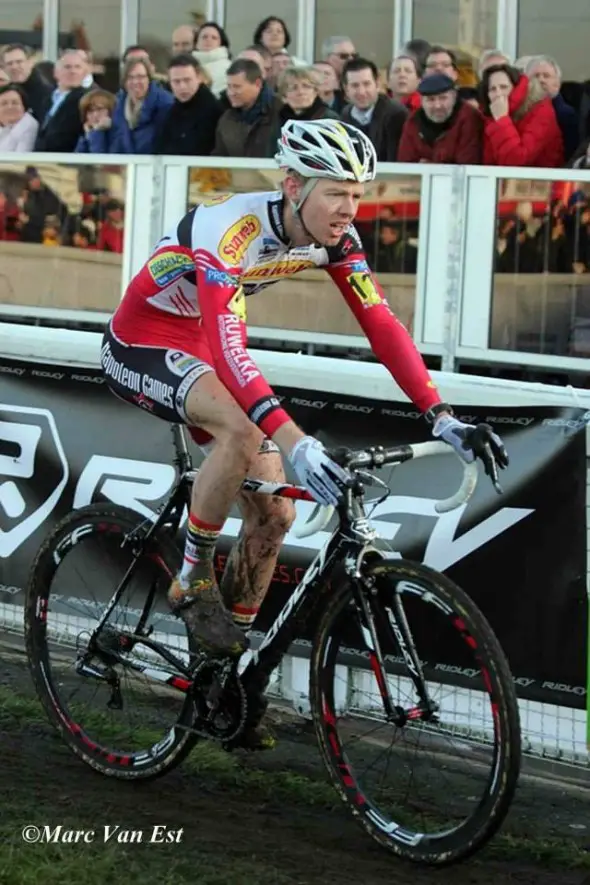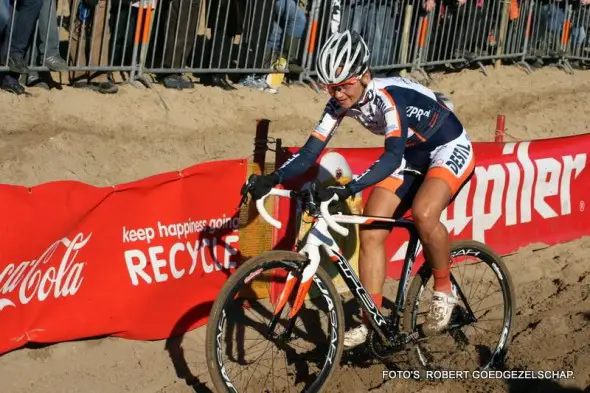by Christine Vardaros
Can you imagine being strong enough to be all but guaranteed a spot in the top 20 at the Elite World Championships, but yet not be able to take the start? When there are too many top quality riders coming out of one country, this happens.
In Belgium, the homeland of ’cross, this is the situation with the Elite Men’s field. In a land where little boys are groomed and supported to be cyclocross-specific racers, there are naturally many more of them who reach the top end of the sport compared other countries. This season there are 14 Elite Belgian riders who are certified professional cyclocrossers—all getting paid a salary to race their ’cross bikes. All strong enough to place top 20 in the World Championships, but yet some of them have not even seen the start of a World Cup this season. And to be chosen for World Championships, where the team selection numbers are even smaller, is a distant dream. For some of these dreamers, if they were to take the start, a chance for a top 10 would be within reach.
To a lesser extent, this dilemma of too many fast riders and not enough spots also exists elsewhere such as with The Netherlands and for the USA women. Netherlander Reza-Hormes Ravenstijn (Orange Babies Cycling Team) was left off the roster for the Valkenburg World Cup but came back in the next World Cup she participated in with a top 10 placing. And on US soil, we’ve seen some standout riders who will be unfortunately sitting out the World Championships.
It is understandable that in a world championship event where you wear your national colors, the national federation chooses the riders. It is also understandable to limit each nation to a set number of riders so as not to overwhelm a particular category with too many riders from one country. In addition, I get why the UCI automatically qualifies the top three riders from each nation as it is the UCI points of those top three riders that is used to rank each nation. This is why, as of this season, the UCI rules were changed for women where the top three ranked riders per nation automatically have a ticket to Worlds. But it still remains unfortunate that a few top riders are left off the start list due to their nationality.
World Championships
My suggestion to help offset this dilemma at the World Championships is to add an extra spot per country for qualification. For instance, instead of the US Elite Women having five automatic spots plus one extra spot for the World Cup overall winner (which Katie Compton earned), they would be allowed six automatic spots plus the extra spot for the World Cup winner. In Belgium, this would mean that the Elite men would replace their six automatic spots plus one extra for the outgoing World Champion (which Sven Nys earned), with seven automatic spots plus one extra for the outgoing World Champion.
There is definitely room on the start line to allow for this increase in riders if you compare the average World Championship start numbers to World Cup numbers. For instance, in the Hoogerheide World Cup last season, there were 61 men and 46 women. A week later at the World Championships, there were only 45 men and 31 women who took the start. As the sport grows, this number can be altered. But for the short term future, this can be helpful to ensure that more top riders line up for the biggest race that cross has to offer.
There will always be the odd federation that chooses not to fill its roster, claiming they only want potential medal winners or top-10 candidates representing their country. National Cyclocross Team coach of The Netherlands, Johan Lammerts, explains how it works in his federation, “Our intention is always to select everybody who is able to do a good performance at the World Championships. However, it can mean that there are places not totally filled for certain categories. I will make the final decision regarding the World Championships team after the World Cup in Nommay [a week before World Championships to be held in his hometown—Hoogerheide, NL]. Riders have the possibility to perform for the last time and it will depend on the last performance if they will be selected for the team.”
World Cups
In the Elite World Cups, the situation is a bit different as riders are wearing their sponsored clothing, as opposed to National Team clothing. Their loyalties in those races are to their teams who pay their salaries. Aside from the periodic teamwork with those sharing the same team sponsors, it is an individual sport. There is little to no country pride actively playing a role in these events. So, when there are too many top riders from one nation and too few spots, is it fair to penalize a rider just because he or she comes from a certain land? And is it fair to leave all the decision-making to the National Teams where there can be possible favoritism or discrimination affecting the outcome of the selections?
One option to address this situation, rumored to be considered by the UCI, is to allow all elite riders who are in the top 50 UCI ranking to participate in all World Cups, regardless of whether or not they are chosen by their federation. This will help to address both the problem of too many strong riders per country as well as riders being left off the start list by their federations due to personal preference such as: not choosing riders because they will not make the podium, they are not nationalistic enough or choosing a “promising” weaker rider over an older rider. Clearly the latter is not a consideration when Belgian National Cyclocross Team Manager Rudy de Bie chooses his riders. “Age shouldn’t be a factor…if you see Sven Nys riding at the top like that!” Unfortunately not all team managers are as open-minded as that, so a new rule like this will protect those riders worthy of taking the start at World Cups.
As a side benefit, this new rule may also encourage folks to venture outside the more popular events in search of collecting these coveted UCI points. In Europe, for instance, you’ll see top elite Belgian men traveling to smaller events outside Belgium—helping to internationalize the sport. In the US, the smaller UCI events may see an increase in participation.
The drawback to this plan is that some claim it will encourage domination in the sport by one country or another—with many fingers pointing in the direction of the Belgian elite men. Even their own National Team Coach De Bie is unsure of the outcome of this proposed plan. “In Belgium, we have 14 pro riders. Now in the World Cups we usually get nine riders to select. If eventually it is increased to 14, then that is five extra riders fighting for a place between 10th and 20th. These are important spots for riders of other nations, so I’m not sure if that would be a good idea for the credibility of the sport. I get that it’s difficult for pro riders. It’s not normal that when you are in Belgium and a pro rider that you can’t take part in the most beautiful races. But it’s not really that simple to give everyone what they want.”
As it stands now, if the rule were to go in effect tomorrow, it would increase the Elite Belgian men taking the start in the next World Cup from 9 to 11 (to include one non-professional—and excluding the U23 riders).
Another option supported by De Bie, that is said to be proposed to UCI, is to allow cyclocross trade teams to be created where all riders on trade teams automatically get entry to World Cups, regardless of whether or not they were chosen by their federations. This is currently implemented in mountain biking, where U23 riders are allowed to race World Cups if they are a member of a UCI mountain bike trade team. This option would surely help those countries who have invested the most in cyclocross.
Affected Riders
The folks who would be affected most by any plans that would go into action are those who have dedicated their lives to the sport, sacrificing all else in order to grow into one of the strongest riders in the world. Folks with dreams, ambitions, drive, and talent. Luckily, some of those such folks appear to be taking it in stride.
Sunweb-Napoleon Games rider Dieter Vanthourenhout, a powerhouse Belgian pro who has not yet been selected for a World Cup this season explains, “For the selections, it’s unfortunate to be Belgian. If I were another nationality, it would be no problem. But on the other hand, it’s pleasant to be a Belgian ’crosser because many races are held here.”
Another rider who would be team leader if he held the nationality of most other countries is AA Drink’s Bart Aernouts. He has raced the World Cups this season but as the roster for World Championships is two riders less than for the World Cups (9 vs 7 spots available), he’s not feeling confident that he will be awarded a spot. “It’s not a good feeling to be left off the start list for Worlds, but my condition is not good enough to be in the first seven of Belgium. I changed my summer trainings a little bit by trying to do fewer hours with more intensity. Maybe that’s the reason I’m slightly off the pace compared to the years before. But you can only deal with something like that after the season. During the season, though, I tried to do my best, tried to train as good as I can. But in the races I come up that little bit too short—it’s just one percent that separates many places.”
Yes, we are often talking about a “one percent” difference between the rider who makes the cut and a rider who does not. If there can be a solution to helping those athletes who fall through the cracks while helping to internationalize cyclocross, I’m all for it. Knowing the representatives we currently have on board at the UCI such as Sven Nys, Helen Wyman, and Marianne Vos, I have full confidence that we are headed in the right direction no matter the paths chosen to get there.

























